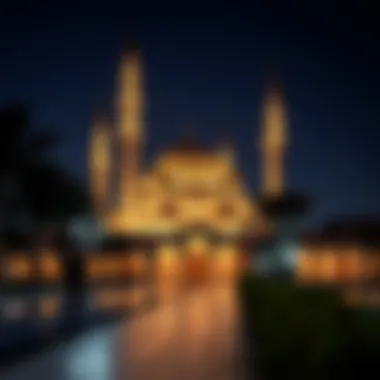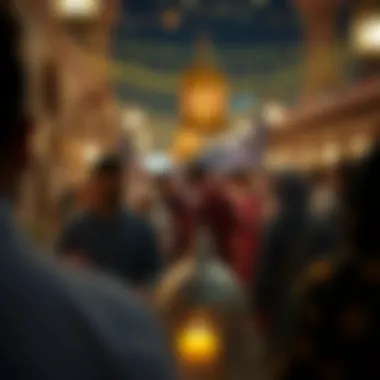Understanding the Ramadan Schedule in Dubai


Intro
In Dubai, daily life shifts in rhythm during Ramadan, showcasing the juxtaposition of tradition and modernity. Fasting, prayers, and community events weave together to form a distinctive tempo that influences various aspects of life, including dining, social interactions, and even business operations. It's crucial for both locals and visitors, as well as investors looking to navigate the real estate market, to grasp the nuances of Ramadan.
The article delves into key elements like prayer timings, the tradition of breaking fast known as Iftar, and community gatherings that flourish during this holy month. Moreover, we will shed light on how Ramadan impacts the local economy, particularly focusing on real estate trends and insights valuable for investors and residents.
As we explore the fabric of Ramadan in Dubai, it’s pivotal to reflect on how these customs play a role not only in daily schedules but in shaping opportunities across various sectors, particularly real estate. This overview will aid in appreciating both the spiritual essence and the practical implications of this sacred period.
Preface to Ramadan in Dubai
Ramadan is much more than just a month of fasting for Muslims; it's a period rich with cultural significance, social interactions, and spiritual reflection. Dubai, with its melting pot of cultures and traditions, offers a unique backdrop for observing Ramadan. This article aims to provide an in-depth exploration of the Ramadan schedule in Dubai, detailing the rituals and routines that punctuate daily life during this holy month.
To understand the significance of introducing Ramadan in Dubai, one must consider the city’s diverse population. With expatriates from nearly every corner of the globe, Dubai showcases an array of traditions intertwined with local customs. Ramadan serves as a powerful reminder of unity and community spirit; it encourages engagement in acts of kindness, charity, and reflection.
The city transforms significantly during this month, adjusting its rhythm to accommodate the religious practices of its residents. From the early calls to prayer echoing through the streets to the bustling atmosphere on the evening of iftar, every moment in Dubai during Ramadan captures a unique essence of togetherness.
Cultural Significance of Ramadan
Ramadan holds profound meaning for Muslims around the world. In Dubai, where the local culture is steeped in traditions, the effects of Ramadan stretch beyond the spiritual.
Importance of Fasting
Fasting from dawn until sunset is a cornerstone of Ramadan. It’s not just about abstaining from food and drink; it’s a time for self-restraint and empathy. This practice cultivates a deeper understanding of the struggles faced by those less fortunate. As Dubai embraces this tradition, one can observe the swell of compassion within the community. Families and individuals often rally together to support those in need, making this a time for social responsibility.
Spiritual Growth
Beyond the social aspects, Ramadan is a time for spiritual growth. It encourages reflection, prayer, and self-improvement. In Dubai, mosques are filled with worshippers engaging in evening prayers, with the community gathering to deepen their spirituality and connect with one another. It shifts the focus back to the essence of community life, reminding everyone of shared values and beliefs.
Economic Impact
Interestingly, the cultural significance of Ramadan reaches into the economic sphere as well. Local businesses adapt to the fasting schedule, offering special iftar menus and extended hours for those seeking evening meals. It's also a peak time for charity organizations, as many residents contribute to charitable causes, supporting those in less fortunate circumstances.
In essence, introducing the Ramadan schedule in Dubai provides an opportunity not only to practice religious obligations but to embrace a wider sense of community, charity, and personal growth. As Ramadan unfolds, the vibrant culture of Dubai shines even brighter, highlighting values of compassion, unity, and resilience that resonate throughout the city.
"The strength of a community lies in its collective spirit, especially during the holy month of Ramadan."
Components of the Ramadan Schedule
Understanding the components that make up the Ramadan schedule in Dubai is essential for anyone who wants to fully experience this holy month. Ramadan is much more than just fasting; it represents a time for spiritual growth, communal bonding, and cultural practices that resonate deeply within the local populace. Addressing the components of the Ramadan schedule allows residents and visitors alike to appreciate the rhythm of daily life during this time. Here, we’ll break down the crucial elements into distinct yet interrelated categories: fasting timings, prayer timings, and the meals known as Iftar and Suhoor. Each of these plays a significant role that can inform one's experience of Ramadan.
Fasting Timings
Fasting during Ramadan—known as Sawm—is one of the Five Pillars of Islam. In Dubai, the fasting period begins at dawn (Fajr) and continues until sunset (Maghrib). It’s crucial for individuals observing the fast to know these timings, as they mark both the start and end of their daily abstention from food and drink.
- Fajr: the first prayer of the day, marks the start of the fast. In Dubai, this typically occurs around 4:30 AM, yet timings may shift slightly each day.
- Maghrib: this is when the fast is broken, usually around 6:45 PM. The exact time varies with the changing days of the lunar calendar.
This fasting schedule calls for strict adherence, making it a habit for many as they plan their meals and manage their daily routines. For investors and businesspeople, understanding these timings is crucial, as they can significantly influence meeting schedules and working hours during this holy month.
Prayer Timings


Prayer is another cornerstone of Ramadan, serving as a reminder of spiritual duties and community unity. In Dubai, the five daily prayers adjust slightly during Ramadan, with particular attention paid to the Taraweeh prayers, which are specific to this month.
- Taraweeh prayers, performed after the night prayer (Isha), occur in congregations and become a nightly ritual for many. Locations such as the Sheikh Zayed Mosque draw crowds for these prayers, creating a sense of unity.
- Other key prayers, including Dhuhr (midday) and Asr (afternoon), remain unchanged but are integral to daily routines.
For those interested in real estate or business, recognizing the timing of these prayers helps to accommodate work schedules and client interactions in sensitive ways.
Iftar and Suhoor
Two meals - Suhoor and Iftar - are integral to the fasting schedule, diving into both nutrition and cultural traditions. Suhoor, the pre-dawn meal, is essential for those fasting, providing the necessary fuel and hydration to last throughout the day.
- This meal is often rich in carbohydrates and proteins. A popular choice includes fare like oatmeal, eggs, and dates, accompanied by ample water to stave off thirst.
At the end of each day, families and communities gather for Iftar to break their fast when the sun sets.
- Iftar meals can be elaborate, ranging from traditional dishes such as harira (a soup), to modern delicacies catered from Dubai's vibrant culinary scene. Restaurants often serve special Iftar menus, drawing together the community to partake in the experience.
Many hotels and community centers in Dubai host massive Iftar buffets, making it a remarkable social event. For the real estate sector, this cultural significance underscores opportunities in hospitality and related markets during Ramadan.
"Ramadan is not just about abstaining from food; it's a holistic experience that transcends mere hunger and fosters connections."
In summary, the components of the Ramadan schedule in Dubai intertwine daily life with profound cultural practices. Fasting timings, prayer schedules, and communal meals serve not just as rituals but as engaging experiences that shape the environment of the city during this sacred month.
Impact on Daily Life
The impact of Ramadan on daily life in Dubai is profound and multifaceted. The month influences not only the rhythm of daily routines for individuals but also shapes business operations and general societal interactions. Every year, as the crescent moon is sighted, a wave of change washes over the city, affecting how people engage with their environment, how businesses operate, and the overall atmosphere in the community.
Business Operation Hours
During Ramadan, business operation hours experience significant adjustments to accommodate those observing the fast. Many workplaces, especially governmental and educational institutions, reduce their working hours, often operating from around 9 AM to 3 PM or even shorter. This shift aims to allow employees the necessary time to prepare for Iftar, the evening meal that breaks the fast.
- Impact on Employees: With shorter workdays, many employees cherish the added time to spend with family or engage in religious practices. However, this can also lead to a compressed workload. Both management and staff may need to adapt on the fly, ensuring that productivity remains high despite the reduced hours.
- Retail Sector Adjustments: In the retail sphere, shopping venues and restaurants may adjust their timings to cater to customers after sundown. Often, shops open later in the evening and remain operational into the early hours of the morning. This jump in business activity post-Iftar can lead to a flourishing marketplace, with bustling crowds enjoying late-night shopping and dining.
Public Transport Adjustments
Public transport also experiences a metamorphosis during Ramadan. The timing and frequency of services typically shift to align with the prayer schedules and fasting hours.
- Bus and Metro Services: The Dubai Metro and public bus services often extend their operational hours, catering to those who travel to and from late-night events and community gatherings. However, during the daytime, some routes may operate on a modified schedule due to understanding the lesser demand as many people are fasting and less likely to travel.
- Traffic Patterns: Typically, traffic congestion sees an unusual spike in the evening as families and friends gather for Iftar. Roads leading to popular dining spots or community centers can become heavily congested. Calculating travel times during this period requires a bit of foresight and adjustment.
"Adjust your agendas during Ramadan; the flow of life in Dubai shifts in a way that’s both unique and rewarding."
Overall, the adjustments during Ramadan impact not only individual choices but stitch together a community fabric that thrives on sharing experiences, values, and the spirit of giving. It’s essential for investors and businesses to account for this nuanced landscape, as understanding the pulse of the city during this holy month can create opportunities and foster stronger community ties.
Ramadan Activities in Dubai
During Ramadan, Dubai transforms into a vibrant hub of cultural and spiritual activities that reflect the values of the month. The significance here is not only in the commitment to fasting but also in fostering community spirit and unity. The activities during this time embody a blend of tradition and modernity, making it one of the most vibrant times of the year for both residents and visitors alike.
Community Events
In Dubai, community events during Ramadan are akin to a festival of joy, bringing people together from all walks of life. Various mosques and community centers organize gatherings that go beyond mere prayers. Think about nightly gatherings where families share Iftar, the meal breaking fast, or cultural seminars that delve into the principles of Islam. This is where you will find exhibitions showcasing local talents, art, and even interfaith dialogues.


Moreover, many neighborhoods arrange activities such as lantern lighting to beautify the streets in the evenings. These events serve multiple purposes: they enhance community ties and offer an opportunity for people to learn about each other’s cultures. The events foster an environment where dialogues can flourish, bridging gaps between different nationalities.
Charitable Initiatives
Charity holds a special place in Ramadan, reflecting the spirit of generosity prevalent throughout the month. In Dubai, various charitable initiatives come alive with a renewed vigor. From soup kitchens springing up in public places to fundraising events hosted by local businesses, the focus on helping the less fortunate becomes a community-wide endeavor.
For instance, organizations like the Dubai Cares often initiate campaigns to provide educational support to underprivileged children both locally and globally. Donating in kind, volunteering your time, or simply spreading the word are ways individuals can partake in these noble initiatives. These activities are instrumental in not just contributing to the welfare of those in need but also infusing a sense of purpose and fulfillment among those who give.
"In Ramadan, the act of giving creates a unique bond among individuals, encouraging a collective effort towards the betterment of society."
The dual focus on community events and charitable initiatives underscores the essence of Ramadan in Dubai - a canvas painted with generosity and a commitment to social responsibility. Both aspects complement each other perfectly, providing a platform to strengthen ties within communities while elevating the spirit of compassion during this holy month.
With these activities, the month of Ramadan highlights understanding, connection, and the ever-important act of giving. As noted, engaging in such events is particularly beneficial for those involved in the real estate market, as they present unique networking opportunities, allowing residents and investors alike to connect on a personal and communal level, fostering long-term relationships based on shared values.
Ramadan's Influence on Real Estate
Understanding the intersection of Ramadan and real estate in Dubai is crucial for investors and stakeholders navigating the fast-paced market. The month of Ramadan not only brings spiritual reflection but also introduces shifts in lifestyle, spending habits, and social gatherings, all of which can significantly impact real estate dynamics. Whether it’s looking to buy, rent, or manage properties, awareness of these influences can help in making informed decisions during this month.
Market Activity During Ramadan
Ramadan often signals a temporary slowdown in certain real estate transactions, as many people are focused on their spiritual commitments. However, it's not a total standstill. On the contrary, there are specific market rhythms worth noting. For instance, while sales might dip initially, interest can spike again as the month progresses, especially as the community gears up for Eid celebrations.
- Increased inquiries: Many people start hunting for new homes right before Eid, aiming to host family gatherings.
- Temporary rentals: Demand for short-term housing tends to rise as people from other countries visit for the festive season.
Additionally, marketing strategies can be tailored for Ramadan. For example, campaigns often highlight the sense of community and family gatherings, tapping into the festive spirit to draw potential buyers.
Short-Term Rental Trends
During Ramadan, the short-term rental market sees familiar patterns. Families gather, which can increase demand for larger accommodations. Apart from traditional tourists, there’s a rise in bookings from expatriates hosting family during this time. This season typically sees:
- Spike in demand: Properties with amenities catering to Ramadan, like spacious kitchens for cooking and communal areas for prayer, can attract higher interest.
- Adjustable rental rates: Landlords might adjust their pricing strategies to accommodate the higher demand during this holy month, potentially boosting revenues.
Thus, owners of short-term rentals can benefit significantly, but they need to remain flexible and responsive to the market fluctuations that can occur during Ramadan.
Long-Term Investor Insights
For long-term investors, Ramadan offers a time for strategy reevaluation. It’s essential to consider how community dynamics shift during this month. As social activities surge, certain areas may see a boost in value due to increased desirability. Investors should keep an eye on several factors:
- Emerging neighborhoods: Areas with a high footfall of Ramadan-related activities can show potential for future appreciation.
- Community amenities: Residential developments that offer spaces for prayer and community gatherings are likely to be more attractive to long-term tenants.
Furthermore, engaging with local communities during Ramadan can foster relationships and insights that prove beneficial later. Understanding local sensitivities around prayer times and communal activities adds another layer of depth to the investment approach.
"Ramadan serves not just as a period of fasting; it also reveals unique real estate opportunities, if you know where to look."
Navigating Ramadan as an Investor
When it comes to investing in Dubai during Ramadan, it’s crucial to engage with the city's rhythm during this holy month. Investors must appreciate that Ramadan alters not only the day-to-day life of residents but also influences market dynamics. The period is often marked by a mix of spirituality, community engagement, and economic adjustments. Understanding these facets can enhance an investor’s strategy, ensuring they make informed decisions that reflect both the market's unique behavior during Ramadan and local culture.
Understanding Local Sensitivities


Ramadan is a time where the local sensitivities are amplified. Observing the fasting hours is not just about refraining from food; it extends to fostering exemplary behavior, respect, and community spirit. An investor must recognize that purchasing or selling properties during this month may be perceived through the lens of local customs.
Key Considerations:
- Respect for Fasting: Engaging in shrewd negotiations can be seen as insensitive if it disrupts the flow of daily life during fasting hours. Schedule meetings and discussions around Iftar—when families break their fast—where more relaxed conversations can happen.
- Cultural Norms: The local populace's commitment to prayer and community is particularly strong. Understanding that business decisions might take longer because of prayer times can streamline interactions and help set realistic expectations.
- Community Engagement: Consider initiating or participating in charitable activities during Ramadan. Corporate social responsibility projects during this time are welcomed, fostering goodwill and establishing trust among the community.
Adjusting Strategies During Ramadan
Adaptation is key when it comes to navigating investment landscapes during Ramadan. On one hand, certain sectors—like retail—may slow down due to fasting. On the other hand, others—like leisure and dining in the evening—may see an upswing. Strategic adjustments are essential.
Practical Suggestions:
- Shift in Focus: Investors might want to shift focus toward properties that cater to evening activities post-Iftar, especially family-friendly options. With the communal dining experience booming after sunset, higher foot traffic around food and leisure establishments can lead to increased revenue.
- Flexible Scheduling: Adjusting marketing campaigns to run later in the evening can resonate more with potential customers, as shopping and socializing often ramp up after dark.
- Market Analysis: Monitoring sales trends throughout the month is essential. For example, the demand for short-term rentals often spikes. Investors should position themselves to accommodate this seasonal influx; those who can advertise stays during ‘Eid al-Fitr’ can maximize returns.
"Investors who respect the spiritual and cultural sensibilities during Ramadan tend to navigate the market more effectively, finding unique opportunities while fostering local relationships."
To conclude, navigating Ramadan as an investor is significantly about balance—understanding local customs while adapting strategies accordingly. By embracing this unique market phase and its cultural context, investors can create meaningful connections and find paths to success that reflect the spirit of the community they are engaging with.
Preparations for Ramadan
As the holy month of Ramadan approaches, the significance of preparations cannot be overstated. For Muslims in Dubai and around the world, this is a period steeped in spiritual reflection, community, and cultural practices. Making appropriate arrangements is crucial, not just for a seamless transition into Ramadan but also to maximize its benefits for both spiritual and communal engagement.
Preparations can encompass various elements from personal habits to community involvement. Understanding these preparations can enhance the experience significantly, contributing to a more meaningful observance.
Community Engagement Tips
Engaging with the community during Ramadan is vital. It fosters a sense of belonging and togetherness, enhancing the experience for everyone involved. Here are some effective ways to engage:
- Participate in Local Iftar Events: Many organizations and mosques host communal iftar dinners, providing not only a chance to break fast together but also to meet diverse members of the community. This could be an excellent networking opportunity for investors as well.
- Volunteer with Charitable Initiatives: The month is synonymous with giving. Getting involved in local charitable efforts can provide enriching insights into the needs of the community, which can be beneficial for those in the real estate sector.
- Encourage Interfaith Dialogue: For non-Muslims and locals alike, participating in interfaith events can cultivate understanding and respect for cultural practices.
- Use Social Media: Leveraging platforms like Facebook and Instagram to share messages of goodwill or organize community activities can create a positive impact.
Engaging in these activities not only supports the community but also enriches one's own experience during Ramadan, making it more fulfilling and vibrant.
Property Management Considerations
For property investors and owners, Ramadan poses unique challenges and opportunities. Being mindful of how the month influences the property market can yield significant advantages. Here are some considerations:
- Adjust Rental Terms: Many landlords consider offering special rental agreements or discounts during Ramadan to accommodate shorter leases for expatriates and visitors. This is particularly relevant for short-term rentals that cater to tourists seeking to experience Ramadan in a culturally rich location.
- Enhance Amenities and Services: Properties that provide iftar meals or host community gatherings tend to attract more tenants or buyers during this time. Offering tailored experiences can result in increased interest.
- Be Mindful of Scheduling: Regular property maintenance activities should be scheduled around prayer times and fasting hours. Ensuring that work does not interfere with communal activities or individual observance reflects sensitivity to the cultural context.
- Market Properties Effectively: Utilize this period to highlight properties that are conducive to communal gatherings, such as those with large dining areas or nearby community centers.
Acknowledging the nuances of managing properties during Ramadan can enhance the experience for both tenants and landlords while potentially optimizing returns on real estate investments.
"Preparing for Ramadan is not merely about adjusting schedules; it's about embracing the spirit of the month and creating a nurturing environment for community and faith."
By thoughtfully engaging with both community and property considerations, investors can navigate Ramadan smartly, building relationships and setting the stage for continual growth in Dubai's dynamic real estate market.
End
Looking Ahead
One of the critical insights gleaned from this exploration is the importance of awareness and adaptation, particularly for investors and residents. The lessons learned during Ramadan can help all parties navigate the complexities of real estate in Dubai with greater finesse. Moreover, as the local culture embraces a more dynamic and interconnected environment post-Ramadan, it can be anticipated that certain trends will likely either persist or evolve.
- For Investors: Understanding how Ramadan influences market activity and community sentiment can inform future strategies. Investors should endeavor to leverage these insights to better align their offerings with the needs and preferences of the community.
- For Residents: Being attuned to the rhythms of Ramadan can foster stronger relationships with neighbors, local businesses, and community organizations. This real sense of belonging is often overlooked but is incredibly valuable.
- For Buyers and Agents: An understanding of the fasting schedule, prayer times, and local customs can enhance the experience for clients and ultimately lead to better decision-making. Knowing how to approach potential buyers with sensitivity to their cultural practices can set an agent apart in a competitive market.
"Ramadan is not just a month of fasting; it's a time for spiritual reflection, improvement, and increased devotion."
In summary, while the article has emphasized the logistical aspects of Ramadan, the underlying message speaks to the heart of what it means to live in a multicultural society like Dubai. As we turn the page, the principles learned during this holy month can lead not just to better business practices but also to a more cohesive and understanding community.







